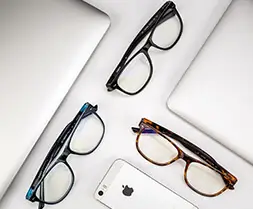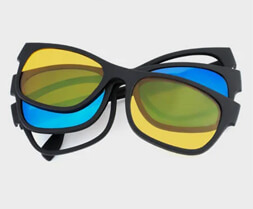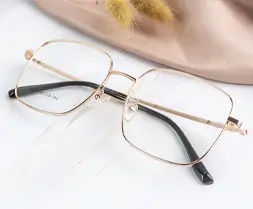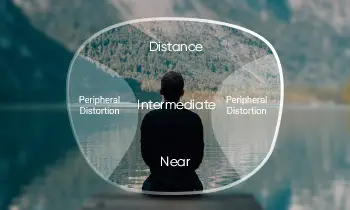"Play video games!" "Watching TV!" ...... As a parent, do you always attribute the reason for your child's nearsightedness to cell phones, TV, and other electronic products? Is it really because of these? That is not entirely true; the prolonged use of electronic products will likely lead to nearsightedness in children. Family genes also play a part in the cause. In addition, there are some causes that you would never expect. Now let's find out what exactly causes nearsightedness in children!
Sweets

Are parents always urging their children to eat fewer sweets to avoid tooth decay or excessive obesity? But did you know? Sweets will not only cause tooth decay and obesity but also accelerate nearsightedness in children.
The food journal article mentions that children should not consume more than 0.5 grams of sugar per kilogram of a child's body weight per day. If a large amount of sugar is consumed for a long time, it can seriously threaten health and lead to poor eyesight and IQ.
Why do sweets cause vision loss?
1. Calcium deficiency. In the process of digestion, sweet food will produce a lot of acids, and the body of calcium neutralization, resulting in a decrease in calcium, and lack of calcium will reduce the eye wall toughness, the eye axis becomes longer, and the formation of nearsightedness.
2. Alteration of osmotic pressure. Excessive sweets also tend to cause changes in the osmotic pressure of the atrial fluid in the eye, causing the lens to bulge and blurring of vision, which can also lead to nearsightedness.
3. Lack of vitamin B1. Sugar metabolism in the body will consume a lot of vitamin B1, and vitamin B1 has a protective effect on the optic nerve. If you often eat sweets, the eyes will not only quickly fatigue but also nearsightedness.
So, to protect your child's eyesight, start with your diet and reduce sugar intake beyond your body's needs. Eat less cake and candy and drink fewer drinks.
There is a misconception here that many parents believe that drinks taste only slightly sweet and should not have much sugar. The sugar content of most beverages today is about 10g/100 ml, so imagine adding about 11 cubes of sugar per 500 ml drink.
To protect eyesight, drink more milk for calcium and protein; eat more vegetables and fruits for vitamins. Reduce the possibility of nearsightedness from daily diet.

Noise
"Tick tock ......" "Clang clang ......" the sound of the horn on the road, the sound of neighbors' renovations ...... is not noisy for your children to do homework? The noise impacts are just too loud after the ears hear the irritation. Not only that, but the sound will also affect eyesight. There is a subtle inner "connection" between the ear and the eye. When noise acts on the auditory organs, it also "ripples" through the nervous system to the visual organs, weakening people's eyesight.
Studies have shown that noise can reduce the human eye's sensitivity to light intensity. When the noise intensity is at 90 decibels, the sensitivity of the optic rod cells in the retina to distinguish between light and brightness begins to decrease and the time to recognize the response to low light is also prolonged. Two-fifths of people have dilated pupils when the noise is at 95 decibels. When the noise reaches 115 decibels, the eye's adaptation to light and brightness decreases by 20%.

When decorating your home, try to choose suitable insulation materials, such as putting soundproof cotton on the walls and choosing double or multi-layer composite structure laminated glass for windows. The sound insulation damping rubber (film) in the middle of the laminated glass plays a crucial role in weakening and attenuating the propagation and has the function of sound insulation. Try to maintain a calm tone of voice when talking at home so as not to affect your child's eyesight.
Psychological factors
The Observer reported that a study by psychologists and ophthalmologists of a sample of 4,000 adolescents with myopia showed that the general decline in vision among adolescents is closely related to psychological factors in adolescents. Scientists have classified the psychological factors contributing to adolescent nearsightedness into three categories.
Conditions in place
While their eyesight is declining, these children often use the excuse that they can't see well enough to avoid heavy study tasks to reduce their psychological stress and to seek sympathy and understanding from their parents and teachers. Most of them are afraid of studying and often look at things in the dark, causing vision loss, which is then often used to avoid studying. Such teenagers with reduced vision may even develop a range of characteristics, such as refusal to attend classes, headaches, vomiting, and nail-biting.
Looking forward eyeglasses
Their psychological vision disorder is usually manifested as follows: the mouth does not say, but the heart is eager to wear glasses, so often in front of people to show bad vision, which is mainly due to wearing glasses in film and television stars and glasses advertising bleaching high or show the scholarly style of worship. Therefore, they are often not myopic and wear other people's glasses indiscriminately; over time, they slowly develop into nearsightedness.
Adverse family environment
Ophthalmologists have found that marital discord, parent-child tension, and parental abuse can cause visual impairment in children, which is mainly seen in preschoolers and is often overlooked.
To slow down the deepening of nearsightedness in adolescents, we need to focus on the psychological demands of adolescents and treat adolescent mental health education correctly. Actively guide children to understand myopia, reduce their study pressure, and establish values for them with effective communication. At the same time, parents should pay attention to the family atmosphere, not argue in front of their children, and gently educate them.





































